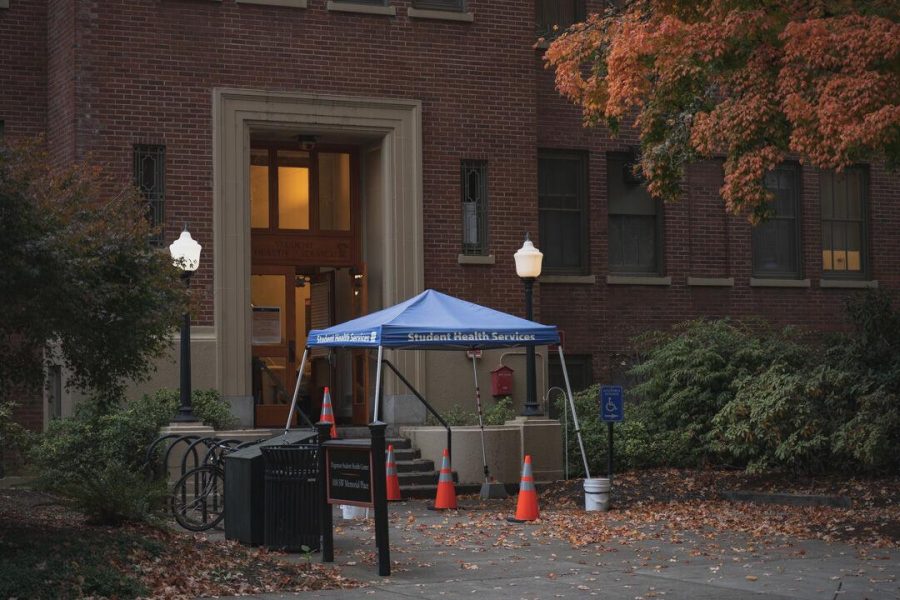Influenza season projected to be impacted by COVID-19 pandemic; flu shots available
November 9, 2020
With the COVID-19 pandemic predicted to continue through the winter months, the 2020 flu season may look different compared to previous years.
Matt Easdale, Associated Students of Oregon State University Coordinator of Corvallis Community Policy, has a few concerns regarding the upcoming flu season.
“The biggest concern I have is there being a spike on COVID-19 cases going into flu season,” Easdale said via email. “It’s all the more important to social distance and prevent the flu so we don’t add a bunch of flu hospitalizations on top of a spike in COVID-19 cases.”
Student Health Services has taken into account COVID-19 guidelines while administering flu vaccinations this flu season in order to better protect community members.
“We highly recommend getting your flu shot this year with the current COVID-19 pandemic,” Kelly Hower, director of Clinical Services, said via email.
However, Hower also stated that due to the restrictions of the pandemic, SHS is currently not accepting walk-in appointments. She recommends that students who would like to schedule a flu shot appointment to call SHS at 541-737-9355. Phone operating hours for scheduling appointments are 9 a.m. to 5 p.m., Monday through Friday, and are unavailable from noon to 1 p.m.
For individuals with allergies, thorough screening is completed before any vaccine is given to a student.
“The nursing team is able to assess the type of allergy and figure out what vaccines are able to be given safely,” Hower explained.
In every flu season, there are two main strands of influenza that are spread through the population: Strand A and Strand B. Dr. Jeff Mull, Oregon State University’s Medical Director at SHS, elaborates on the significance of the two strands.
“The main difference between Influenza A and B is that A can infect animals other than humans and B cannot,” Mull said via email. “That is why A can spread more rapidly and is the strain responsible for pandemics. Though both strains can cause severe disease, infections with type B tend to be milder. Most seasons in Oregon, we see a much larger percentage of type A infections.”
Jeffrey Bethel, a professor of epidemiology at OSU, recognizes that the current COVID-19 health crisis will create a lot of uncertainty for the upcoming flu season. However, he stated that there has been data available from the Southern Hemisphere which has already experienced its flu season.
The data showed influenza activity was more mild and had decreased, Bethel said. “That’s promising for the Northern Hemisphere. It could have been that these COVID-19 mitigation practices like frequent handwashing, staying home when you’re sick, wearing a mask and social distancing led to a decrease in flu activity.”
SHS is committed to providing all OSU students with affordable flu vaccines throughout the flu season, offering flu vaccines at discounted rates.
“SHS medical staff discuss flu vaccines with every patient seen in the clinic or by telehealth and patients are strongly encouraged to receive a flu vaccine at their earliest opportunity,” Hower said. “Students with OSU sponsored insurance receive vaccines with $0 copays and no out of pocket expenses. Students with other insurance should contact their insurance carrier for information about in-network coverage for flu vaccines.”
The Affordable Care Act — also known as Obamacare — further assists students, mandating that all insurance carriers must cover flu vaccines at 100% when received from an eligible provider or pharmacy.
Although the data and availability of vaccinations seem hopeful, Bethel warns that clinicians may have a difficult time as patients seek medical treatment during the flu season in the midst of the current pandemic.
“A key issue is the ability of clinicians to differentiate between flu and COVID-19,” Bethel said. “Particularly because the symptoms are so similar early on, clinicians need a quick and available way to differentiate between cases of the flu and cases of COVID-19 to administer appropriate treatment.”



















































































![Newspaper clipping from February 25, 1970 in the Daily Barometer showing an article written by Bob Allen, past Barometer Editor. This article was written to spotlight both the student body’s lack of participation with student government at the time in conjunction with their class representatives response. [It’s important to note ASOSU was not structured identically to today’s standards, likely having a president on behalf of each class work together as one entity as opposed to one president representing all classes.]](https://dailybaro.orangemedianetwork.com/wp-content/uploads/2025/03/Screenshot-2025-03-12-1.00.42-PM-e1741811160853.png)























